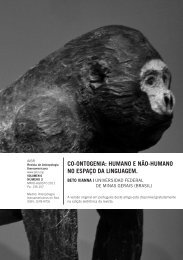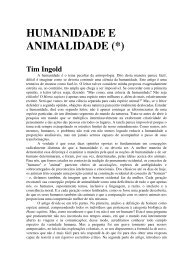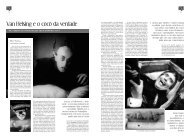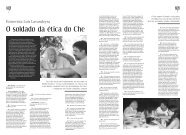Merleau-Ponty, 1964. Eye and mind. - Biolinguagem
Merleau-Ponty, 1964. Eye and mind. - Biolinguagem
Merleau-Ponty, 1964. Eye and mind. - Biolinguagem
- No tags were found...
You also want an ePaper? Increase the reach of your titles
YUMPU automatically turns print PDFs into web optimized ePapers that Google loves.
cultural regimen in which there is neither truth nor falsehood concerning humanity <strong>and</strong><br />
history, into a sleep, or nightmare from which there is no awakening.<br />
Scientific thinking, a thinking which looks on from above, <strong>and</strong> thinks of the object-ingeneral,<br />
must return to the "there is" which precedes it; to the site, the soil of the sensible<br />
<strong>and</strong> humanly modified world such as it is in our lives <strong>and</strong> for our bodies—not that<br />
possible body which we may legitimately think of as an information machine but this<br />
actual body I call mine, this sentinel st<strong>and</strong>ing quietly at the comm<strong>and</strong> of my words <strong>and</strong><br />
my acts. Further, associated bodies must be revived along with my body—"others," not<br />
merely as my congeners, as the zoologist says, but others who haunt me <strong>and</strong> whom I<br />
haunt; "others" along with whom I haunt a single, present, <strong>and</strong> actual Being as no animal<br />
ever haunted those of his own species, territory, or habitat. In this primordial historicity,<br />
science's agile <strong>and</strong> improvisatory thought will learn to ground itself upon things<br />
themselves <strong>and</strong> upon itself, <strong>and</strong> will once more become philosophy….<br />
Now art, especially painting, draws upon this fabric of brute meaning which<br />
operationalism would prefer to ignore. Art <strong>and</strong> only art does so in full innocence. From the<br />
writer <strong>and</strong> the philosopher, in contrast, we want opinions <strong>and</strong> advice. We will not allow<br />
them to hold the world suspended. We want them to take a st<strong>and</strong>; they cannot waive the<br />
responsibilities of humans who speak. Music, at the other extreme, is too far on the hither<br />
side of the world <strong>and</strong> the designatable to depict anything but certain schemata of Being—<br />
its ebb <strong>and</strong> flow, its growth, its upheavals, its turbulence.<br />
Only the painter is entitled to look at everything without being obliged to appraise what he<br />
sees. For the painter, we might say, the watchwords of knowledge <strong>and</strong> action lose their<br />
meaning <strong>and</strong> force. Political regimes which denounce "degenerate" painting rarely<br />
destroy paintings. They hide them, <strong>and</strong> one senses here an element of "one never<br />
knows" amounting almost to an acknowledgment. The reproach of escapism is seldom<br />
aimed at the painter; we do not hold it against Cézanne that he lived hidden away at<br />
L'Estaque during the Franco-Prussian War. And we recall with respect his "life is<br />
frightening," although the most insignificant student, after Nietzsche, would flatly reject<br />
philosophy if he or she were told that it did not teach us how to live life to the fullest. It is<br />
as if in the painter's calling there were some urgency above all other claims on him.<br />
Strong or frail in life, but incontestably sovereign in his rumination of the world,<br />
possessed of no other "technique" than the skill his eyes <strong>and</strong> h<strong>and</strong>s discover in seeing<br />
<strong>and</strong> painting, he gives himself entirely to drawing from the world—with its din of history's<br />
glories <strong>and</strong> sc<strong>and</strong>als—canvases which will hardly add to the angers or the hopes of<br />
humanity; <strong>and</strong> no one complains. 2 What, then, is the secret science which he has or<br />
which he seeks That dimension which lets Van Gogh say he must go "still further"<br />
What is this fundamental of painting, perhaps of all culture<br />
II<br />
The painter "takes his body with him," says Valery. Indeed we cannot imagine how a <strong>mind</strong><br />
could paint. It is by lending his body to the world that the artist changes the world into<br />
paintings. To underst<strong>and</strong> these transubstantiations we must go back to the working,<br />
actual body—not the body as a chunk of space or a bundle of functions but that body<br />
which is an intertwining of vision <strong>and</strong> movement.<br />
I have only to see something to know how to reach it <strong>and</strong> deal with it, even if I do not<br />
know how this happens in the nervous system. My moving body makes a difference in<br />
the visible world, being a part of it; that is why I can steer it through the visible. Moreover,<br />
it is also true that vision is attached to movement. We see only what we look at. What<br />
2









